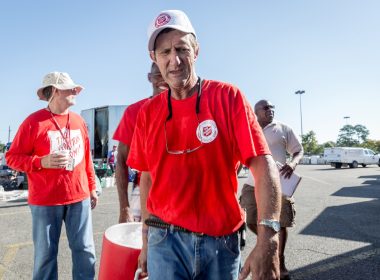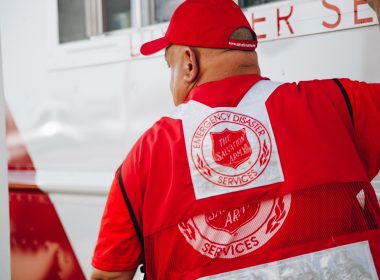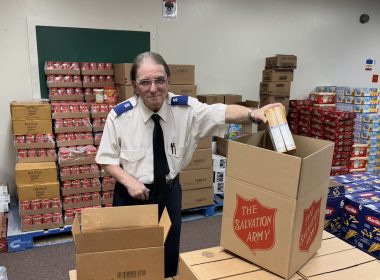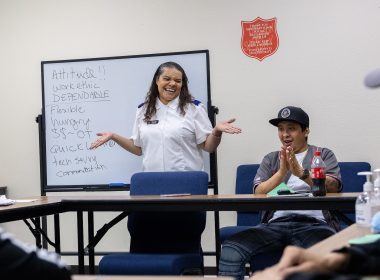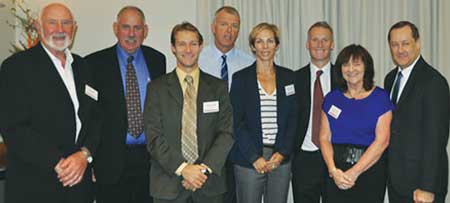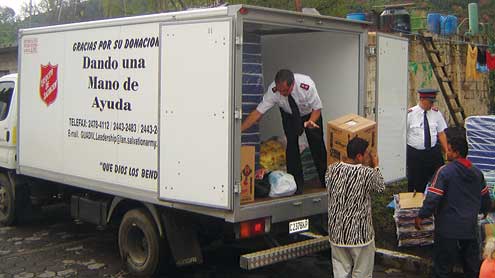Civil War
Text and photos
by Sue Schumann –
Nestled among the gently rolling hills of northern Bosnia-Herzegovena, the town of Sipovo is slowly making its way back to normalcy after months of occupation and widespread destruction by Croat forces. Playing a key role in its recovery is an international team of Salvation Army relief workers.
While Sipovo is primarily a Serbian town, in many ways it is “everytown” in the former Yugoslavia, having experienced the effects of war as did Croat and Muslim communities: during the fall and winter of 1995-96 it sustained significant damage, homes were destroyed, neighbors turned against neighbors, horrors were suffered, and painful memories and losses were endured.
Today in Sipovo, homes and businesses are being rebuilt, the economy is growing healthier, relationships are becoming restored and shattered lives are slowly healing.
The Salvation Army began relief work in the former Yugoslavia in 1995–a beautiful country shattered by the complexities and atrocities of its civil war–and has provided assistance without reservation ever since. It often partners with other non-government organizations (NGOs) in providing relief.
Near Tuzla, Bosnia, for example, the Army worked with Diakonie Werk, a German-based Christian NGO, to build apartments for 2,000 Muslims. In a Croatian community in Zagreb, it worked with Children First in a psycho-social program which included teaching teachers to help children and whole families suffering the traumas of war.
“The ability of the Army team to serve without becoming involved in the political struggle is a testimony to the skillful sensitivity of Salvation Army leadership,” said Colonel Bill Luttrell, who with Colonel Gwen Luttrell and New Frontier Managing Editor Sue Schumann spent nearly a week in Bosnia recently to observe and report on the Army’s work there.
New role model
In a major departure from traditional relief work–and one which is becoming an emerging standard for international relief agencies–the Army is focusing on one community, Sipovo, where it is playing a primary role in rebuilding, restoring and renewing the community through “self-help” programs. Before the war, the population was 85 percent Serbian and 15 percent Muslim.
According to Major Roland Sewell, coordinator for emergency and refugee services, the Army chose this location because “there was an obvious need, no other NGOs were helping there, and geographically, it was small enough to make an impact.” The Army’s work began with a field kitchen in April 1996, which eventually fed up to 1700 people a day.
He admits some questioned the Army’s presence, saying the Bosnian Serbs had done much harm. His response: “We are going to help people in need. We must not be clouded by political issues, although we must be aware of them.”
Sipovo is also one of five clusters in Bosnia the United Nations will direct donors to, due to the chances of success in rebuilding and restoration.
“The Salvation Army can make a big impact on a small community,” explains U.S. Central Territory officer Captain Patricia Kiddoo, who recently assumed responsibility for the Army’s work in Sipovo. “We were the first ones with that philosophy and now other relief groups have that approach. ”
One important element in the Army’s success has been a commitment to maintain its presence as long as possible–as long as a need exists and funding is available to meet the need. “The Salvation Army is the only NGO that has stayed and followed through in Sipovo,” she adds. “People here know we’re committed. They trust and respect us.”
Now, the Army is helping to rebuild the local economy through programs including micro-economics, construction and rehabilitation of housing, education, and the efforts of an international summer service corps team. Assisting team members Kiddoo, Dawn Lambert (from the U.K.), Martyn Smith (New Zealand) and Western Territory Intermountain Division volunteer Tim Kercher is a dedicated and hardworking team of local residents. “God has blessed us with a staff second to none,” says Kiddoo. “They work tirelessly, are devoted, kind and compassionate to people they work with.”
Kiddoo, Lambert and Smith served on the first disaster relief team in Sipovo in 1996, and previously worked in Rwanda with the Army.
Without a doubt, this is a unique Salvation Army expression. Creativity in developing the work has been encouraged, with the intent of its remaining under the direction of The Salvation Army or, at some point, being handed over to the evangelical expression of the Orthodox Church.
Supportive relationships
The Army enjoys supportive relationships with the local government, with NATO forces responsible for peace keeping, and with other NGOs in the area.
During a recent meeting between President Dragan Djukic (one of the town’s three governing officials), Kiddoo and the Luttrells, Djukic praised the Army for its role in the Sipovo’s reconstruction. “The Salvation Army and the municipality agreed to work together in rebuilding. Politics were never mentioned in the talks, which we can’t say of other organizations who pressured us and more…I appreciate what The Salvation Army did for my community. Its feeding program this winter saved us.”
Djukic recounted the extensive devastation the town suffered: the population dropped from 15,000 to 12,500; 1,500 homes totally destroyed, almost all homes and apartments suffered damages from theft; factories were left empty because of the destruction and theft of machinery, livestock was completely destroyed, and systems such as roads, water, and electrical all sustained major damage.
Before the war, the town had five factories, including gypsum, clothing, aluminum and a sawmill. It was also a prime vacation destination, with abundant fishing and hunting, and was rich in agriculture and dairy production.
TEAMWORK–Central Territory Captain Pat Kiddoo, program director, exchanges information with a NATO SFOR (Stabilization Forces) member. Kiddoo, who is highly regarded by community and the military, also spent 15 years in Chicago’s inner city as a nurse and was a Peace Corps volunteer in Ethiopia. She is on loan to IHQ. |
NATO cooperationCooperation and support for the Army from NATO military forces, which are mostly British in this sector, have been significant. “We have enormous respect for The Salvation Army and for Pat,” says Major Tim Allen, officer commanding “C” Squadron, the King’s Royal Hussars, who is responsible for 400 military personnel. “Most everything The Salvation Army has done isn’t dependent on the political situation.
“We have 115 people looking after Sipovo, who are patrolling continuously. This gives us contact with a broad spectrum of people. We can get information, and can publicize aid from The Salvation Army for the people for meals, clothing distribution, and so on.” |
Allen said that in the past few days it had been difficult for the forces. (Ed. note: Two Serbian war criminals had been apprehended by British forces in Prijedor two days before. One was killed, one was taken into custody. Feelings against NATO forces were running high.) “We’re trying to maintain stability. The country had been moving toward democracy and this war disrupted it. The feeling on the streets is that only time will heal. ”
He noted the complexity of the Dayton accord, signed in November 1995 to end the war in the Balkans. “Some of its terms are difficult. Some issues may have to be revisited or attitudes may have to be re-adjusted.” For example, the “freedom of movement” is enormously complicated and has been hard to implement. Often, people returning to their homes find someone else is now living there.
In addition, Dayton set a time line for military withdrawal but not for displaced peoples returning home: “People say, ‘in time.’ The international community says ‘You signed it, so do it now’. Our goal is to create a stable environment here where international force is not needed. My personal feeling? It’s not an ethnic or religious issue, but an economic problem. Different ethnic groups are in different areas. If the economy here were thriving, a lot of perceived advantages or disadvantages would be removed, and there would be harmony.”
Kiddoo relates in a significant manner to other NGOs at a weekly meeting held in Banja Luka under the auspices of the UN/ HCR (United Nations High Commission for Refugees). More than 60 were in attendance at a recent meeting, and tensions were palpable as representatives were informed about potential repercussions from the arrests in Prijedor and were cautioned to be aware of increasing antiforeign sentiments.
After the NATO SFOR (Stabilization Force) representative reported on the war criminal actions, he provided an update on the number of incidents relating to unexploded mines and ordinance (it’s estimated it will take up to 30 years to clear the country of mines, which are often found by farmers plowing their fields).
Other reports followed by the World Health Organization (WHO), UNESCO, USAID, World Vision, the World Bank, and others. Kiddoo gave an update on the Army’s program to import pregnant cows from Germany and their necessary 30 day quarantine. She then gave an overview of the micro-economics dairy project which elicited interest and response from other participants.
KINDERGARTEN–The Salvation Army runs a kindergarten
|
Spiritual impactWhile the Army’s primary mission is to help the town and its people in a manner that provides long term economic and social recovery, underlying that mission are the forces motivating the Army workers themselves: the love of God and love for the victims of the war.
Giving voice to that love takes time and patience, and relationships and trust must first be built. “I’d like to steer things in a spiritual direction,” says Kiddoo, “but I don’t want to appear to proselytize. The problem is how to address spiritual needs without appearing to promote our own church or threaten the local church.” |
Practical expressions of caring provide opportunities for the team. For example, when mines killed two men recently, Dawn and Pat visited their homes. In one, they felt comfortable enough to pray with the family.
While the Serbs are traditionally of the Orthodox faith, during the years of Communism under Tito, atheism was the accepted belief.
The Army enjoys a good relationship with the local Orthodox Church and with its priest. His home, destroyed during the war, was rebuilt through Army programs. “He has been supportive of Salvation Army work,” says Pat.
All whose lives–or businesses–or homesor farms–have been touched by The Salvation Army express heartfelt thanks for its presence.
High up on a country road, overlooking the green valley dotted by farms and houses and the town of Sipovo itself, 67 year-old Rakita Ilija thoughtfully recounts the rich agricultural heritage of the area, devastated during the war. His family used to be wealthy, he says, with five cows, 100 sheep, a tractor, horse, and electric mill to grind wheat.
When they returned after the occupation, they found their home destroyed and their livestock gone. Later, they discovered the bones of their bull in the yard.
Now, they have a home The Salvation Army helped rebuild and they have a cow, all part of the Army’s self-help program. They, in turn, will help others.
“We like The Salvation Army,” says Ilija. “Other armies came who were not good. When The Salvation Army came, it was a good army.”
To gather facts for this special ‘Hot Spots’ edition, New Frontier Managing Editor Sue Schumann accompanied Colonels Bill and Gwen Luttrell, Western Territory secretary for Personnel and Women’s Ministries secretary, respectively, on a two-week fact-finding trip to the Czech Republic and Bosnia.In addition, personal interviews at International Headquarters in London provided current information on other Army ‘hot spots.’ Most of the articles in the issue were written by Schumann.
Given the significant work the Army is doing under difficult conditions in crisis situations around the world, we felt this information would be valuable for our readers to have.

